Sri Lanka’s North: Rebuilding under the Military
16 March 2012: Sri Lanka’s military is dominating the reconstruction of the Northern Province, weakening international humanitarian efforts and worsening tensions with the ethnic Tamil majority. Since the war ended in 2009, hundreds of millions of dollars have
poured into the province, but the local populations, mostly left destitute by the conflict, have seen only slight improvements in their lives. Instead of giving way to a process of inclusive, accountable development, the military is increasing its economic role, controlling land and seemingly establishing itself as a permanent, occupying presence. Combined with what many Tamils see as an effort to impose Sinhala and Buddhist culture across the whole of Sri Lanka and a failure to address many social aspects of rebuilding a society after conflict, these policies risk reviving the violence of past decades. Donors should put government accountability, the needs of returnees and the expansion of a democratic political role for the Tamil minority at the heart of their aid policies or risk contributing to a revival of ethnic extremism.
The heavy militarisation of the province, ostensibly designed to protect against the renewal of violent militancy, is in fact deepening the alienation and anger of northern Tamils and threatening sustainable peace. Major new military bases require the seizure of large amounts of public and private land and the continued displacement of tens of thousands. The growing involvement of the military in agricultural and commercial activities has placed further obstacles on the difficult road to economic recovery for northern farmers and businesses. When challenged by public protest, the military has shown itself willing to physically attack demonstrators and is credibly accused of involvement in enforced disappearances and other extrajudicial punishments.
The government points to the many new roads, rapid economic growth and numerous new infrastructure projects as signs of a post-war “northern spring”. For most of the more than 430,000 people who have returned to their lands and villages over the past two years, however, there has been little benefit. Residents of the Vanni region – the mainland of the Northern Province – returned to a land devastated by the final years of war: almost all homes and buildings were destroyed; most personal property was lost, damaged or looted. Most returnees remain in makeshift and inadequate shelters and many struggle to afford food, with few jobs or economic opportunities and little or no savings. Few schools and medical centres have been rebuilt. Women in the north face particularly difficult situations: female-headed households, many without permanent shelter or regular income, in the context of domination by a male, Sinhalese military are extremely vulnerable.
Gender-based violence and the Sinhalisation of the Northern Province through cultural and demographic changes have been addressed in Crisis Group’s two most recent papers on Sri Lanka, the latter a companion report to this one. This report examines the dominance of the military in the reconstruction of a region that was almost completely destroyed during decades of war. It also looks at the ways in which military priorities have shaped the government’s and the international community’s response to the deprivations of the local population. A focus on physical infrastructure over the rebuilding of a confident, open society benefits the military and the political elite – financially and otherwise – at the expense of the majority of the province’s population.
Government restrictions on aid and early recovery activities, often enforced by local military commanders, have prevented the effective delivery of many social services, including systematic and effective trauma counselling and other psycho-social support to families struggling to cope with the deaths and disappearance of tens of thousands of relatives. The military’s influential role over northern development policy – through the Presidential Task Force on Resettlement, Reconstruction and Security in the Northern Province (PTF) and at the district level – has marginalised the largely Tamil civil administration and led to ineffective and ethnically biased rebuilding. More generally, the government’s emphasis on large-scale development projects has diverted resources and energies away from the more immediate needs of returnees. Donors and development and aid agencies have done too little to speak out about or effectively challenge these policies, even as they undermine the prospects for sustainable return and recovery.
International engagement with Sri Lanka should prioritise the reestablishment of civilian and democratic governance in the north, and the end of the military control over development activities. Donors, particularly the multilateral agencies, China, India and Japan, should insist that their programs address the pressing needs of the more than 430,000 returnees in a manner that is transparent and accountable to the local population. They should press the government to lift onerous restrictions on the delivery and monitoring of assistance. UN agencies and non-gov ern men tal organisations (NGOs), with the support of their donors, should more actively resist the government’s tight controls over their operations, better defend humanitarian principles, and push for the restoration of civilian authority throughout the north. Monitoring of projects must go beyond platitudes to ensure that reconstruction money does not fuel the culture of corruption and the erosion of democracy that have worsened despite the end of the war.
Read full report http://www.crisisgroup.org/en/regions/asia/south-asia/sri-lanka/220-sri-lankas-north-ii-rebuilding-under-the-military.aspx
Colombo/Brussels, 16 March 2012

